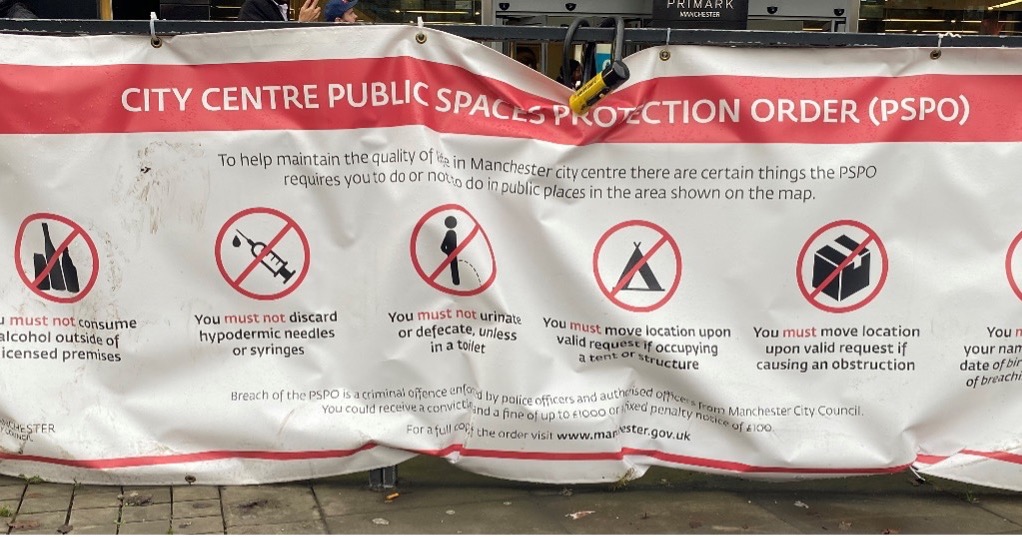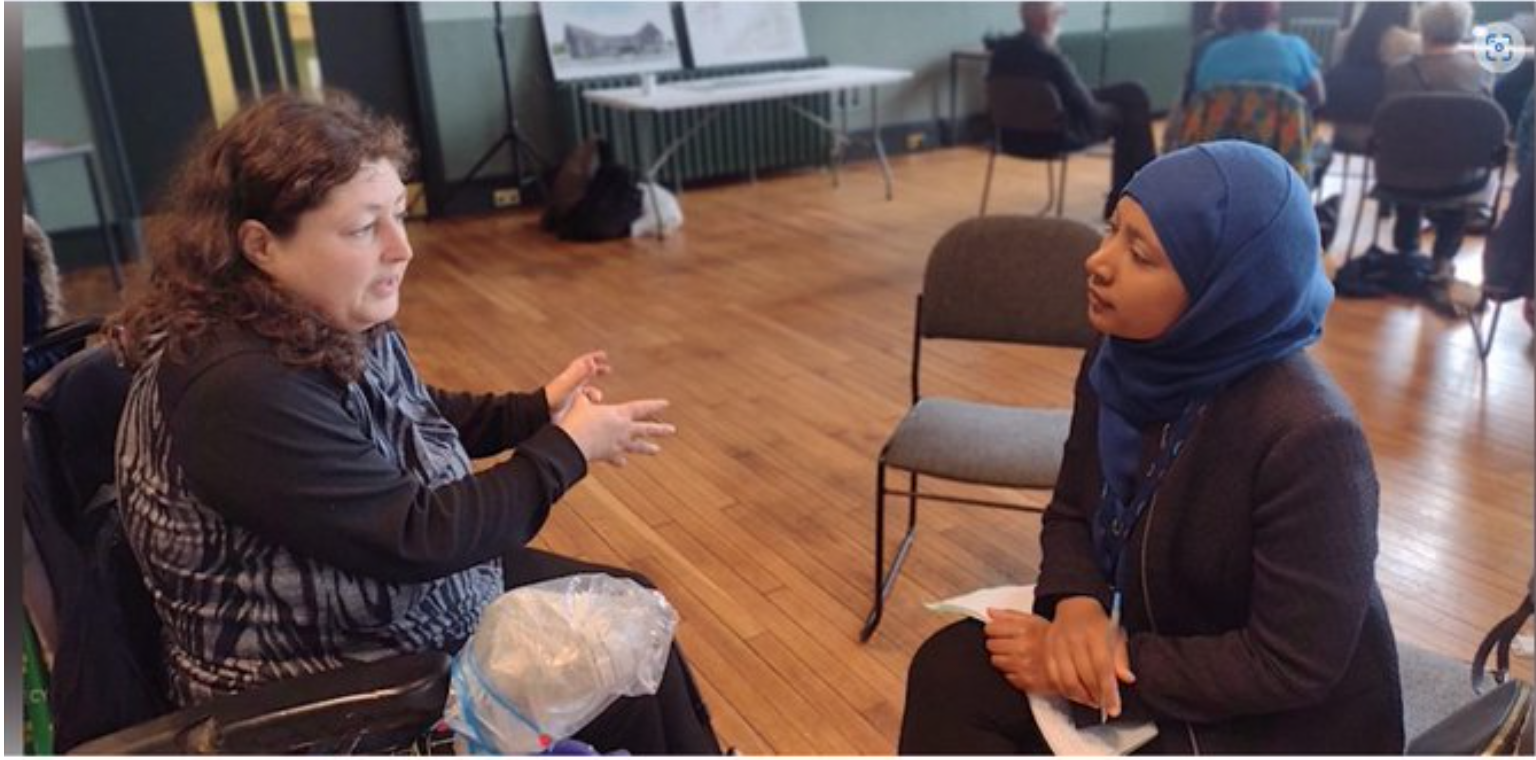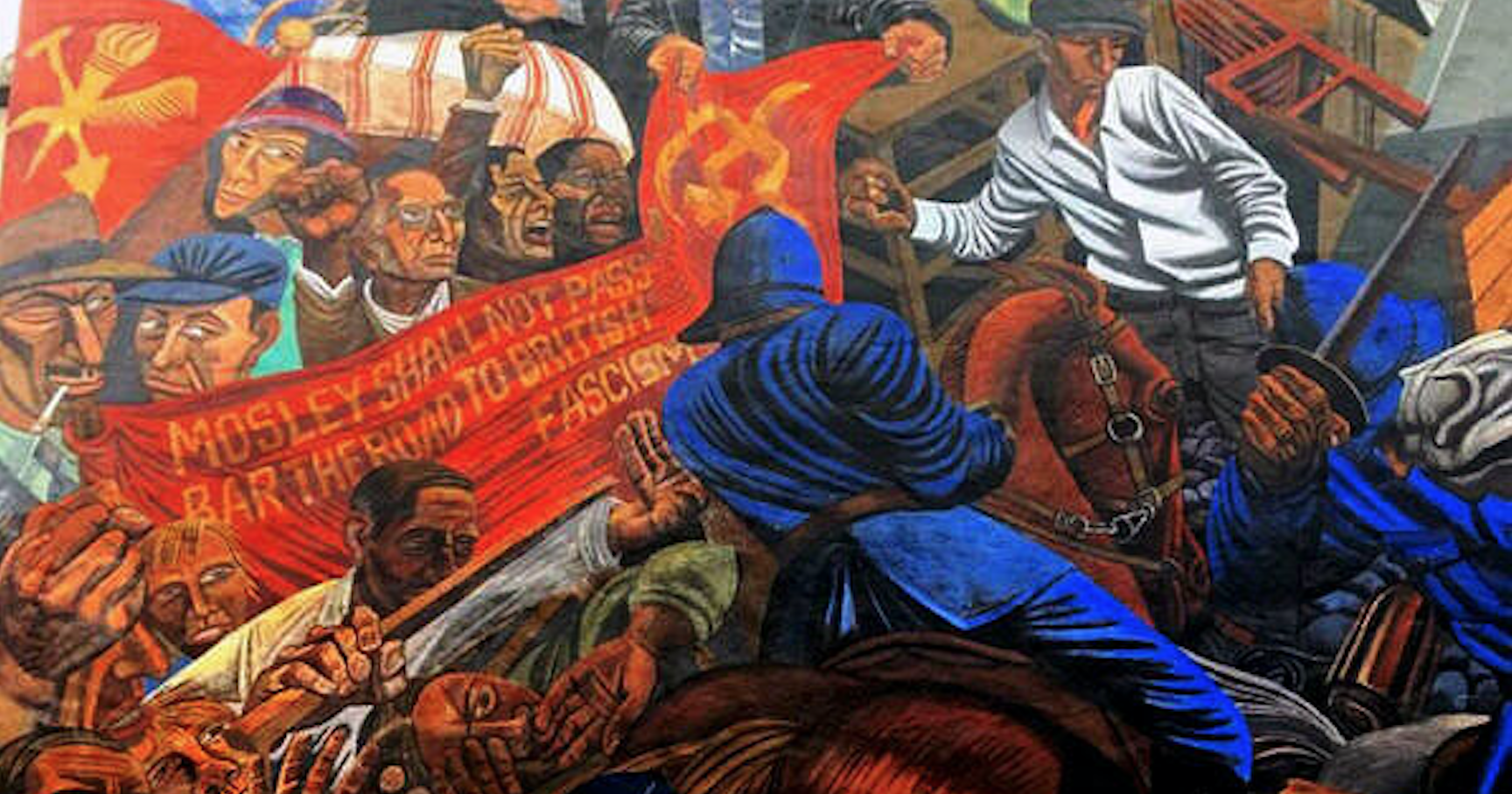By Isis Barei-Guyot
What is a PSPO?
As we approach a time of year that is extremely challenging for those rough-sleeping in the UK, particularly due to harsh weather conditions, it is concerning to see that a banner for a City Centre Public Spaces Protection Order (PSPO) has been erected in Manchester’s Piccadilly Gardens. Public Spaces Protection Orders, according to Manchester City Council’s website, are rules put into place to deal with “problems” or “nuisance” in an area that is affecting the local community’s quality of life, ensuring that we can “all” use and enjoy public spaces, “safe from antisocial behaviour”.
Manchester council has previously stated that the heavily challenged PSPO is focused on anti-social behaviour, and is not intended to target rough sleepers. Yet the original plans for a PSPO in 2019 proposed to fine individuals £100 for intimidating or aggressive begging, and the banner in Piccadilly Gardens prohibits the following:
- You must not consume alcohol outside of licensed premises
- You must not discard hypodermic needles or syringes
- You must not urinate or defecate, unless in a toilet
- You must move location upon valid request if occupying a tent or structure
- You must move location upon valid request if causing an obstruction
- You must provide your name, address and date of birth if suspected of breaching this order
Who is it for?
It has been widely acknowledged both within and outside of academia that access to citizenship often rests on an individual’s ability to conform to a set of behaviours that are deemed socially acceptable. This is reflected in the PSPO’s focus on keeping citizens safe from ‘antisocial’ behaviour. Yet it has also been acknowledged that citizenship is increasingly tied to the ownership of property, (see Ananya Roy’s work on propertied citizenship) and as the PSPO demonstrates, those without property are generally considered to be sources of antisocial behaviour.
The antisocial behaviours listed above often cannot be avoided by those without access to shelter, such as needing to urinate and defecate when there is an identified shortage of public toilets in Manchester’s City Centre, the ones that are provided do not always remain open during the evening, and rough sleepers are often not welcomed within establishments offering toilet access to the public. It is also worth noting that access to water and sanitation is a human right.
The use of ‘obstruction’ is also vague, are all bodies that take up space therefore open to being labelled as obstructions? Who decides if requests are valid? Finally, when the prohibited behaviours obviously affect the rough-sleeping population more than other populations, it is concerning to see the provision of an address is a must. If a rough-sleeper cannot provide these details, it could be considered a criminal offence, which could lead to a fixed penalty notice of £100, or prosecution, which could lead to a fine of up to £1,0000. The consequences of this for an individual who does not have access to housing are obvious.
The disproportionate effect that fines have on those with lower incomes as opposed to those with higher incomes has been acknowledged repeatedly, yet authorities continue to impose them, and continue to profit. It is therefore also worth considering that the relocation of Manchester’s Christmas Markets to Piccadilly Gardens in 2021, and the potential financial gain to Manchester Council from tourism, will influence the vigour with which the order is enforced.
Developing with compassion
This is not a denial that there is antisocial behaviour in Manchester’s City Centre, or even Piccadilly Gardens. Instead, it is suggested that the PSPO disproportionately targets the rough sleeping population, allowing Manchester Council to bypass taking responsibility for what has been labelled a ‘homeless crisis’ in Manchester, and placing the responsibility on rough-sleeping individuals themselves. As noted in a letter written to Manchester City Council by Psychologists for Change challenging the proposed PSPO:
“Whilst it is acknowledged that rough sleepers may engage in behaviours such as substance use and crime, it is once again emphasised that such behaviours are very rarely a ‘choice’ and may be more accurately understood as a survival strategy.”
Once again, the focus on individual responsibility and a rejection of state responsibility within the PSPO correlates with understandings of neoliberal citizenship and austerity urbanism.
Who, then, is the “all” that this order proposes to serve? Will rough sleepers be able to enjoy public spaces more as a result of this PSPO? Unlikely. The mayor of Manchester Andy Burnham has been quoted as saying “no woman or girl should have to live in fear of going out”- what about the safety of women rough sleeping in Manchester’s city-centre?. In conclusion, this PSPO is to make people feel safe from rough sleepers, implying that, regardless of citizenship, rough-sleepers do not have the same right to safety in Manchester as those with access to housing, and therefore do not have a right to the city.
Realistically, the majority of us are a lot closer to becoming homeless than becoming a billionaire, and it is therefore worth considering what the future of a society that prioritises the safety of some over the safety of others will look like. While a clean, safe and welcoming city centre is obviously desirable, there are options beyond denigrating a population which does not have the resources or recognition to defend itself, but this requires us to move beyond considering homelessness or rough sleeping to be a lifestyle choice, and instead challenging the structures in our society that tolerate social injustices against fellow citizens.
Isis is a second year PhD Development Policy and Management student in the Global Development Institute at the University of Manchester.
26 November 2021





